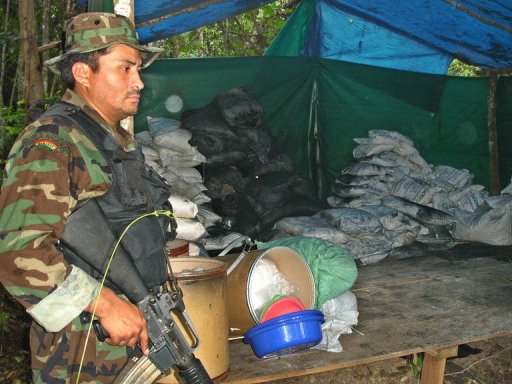
(above) Bolivian anti-narcotics officer stands guard after a raid on a cocaine-processing plant.
Photo: AFP
US sets conditions for duty-free treatment of Bolivia
December 29, 2009 - AFP
WASHINGTON -- Bolivia must improve anti-drug trafficking cooperation with the United States if it wants to benefit from a duty-free trade program with Andean nations, the White House said.
Bolivia was suspended from the Andean Trade Promotion and Drug Eradication Act (ATPDEA) a year ago, after leftist President Evo Morales expelled the US ambassador, claiming he meddled in Bolivia's internal affairs.
US President Barack Obama on Monday signed a bill extending the ATPDEA to Colombia, Ecuador and Peru to December 31, 2010.
"The legislation did not restore benefits to Bolivia," the White House said Tuesday in a statement.
"We believe that the United States and Bolivia need to work closely together to improve cooperation with respect to our common objective of combating the production of and trafficking in illicit narcotics," it said.
"The president has directed the administration to work with the government of Bolivia to improve cooperation, and if cooperation improves, to work with Congress to restore benefits to Bolivia under the ATPDEA program," it added.
Morales, Bolivia's first indigenous president, criticized the US decision, saying he failed to understand how "a marginalized black man can marginalize an Indian."
"The so-called Indians and blacks throughout world history have been the most marginalized... If (Obama) wants to exclude us (from the ATPDEA) let him continue doing so.
"It doesn't matter. He most likely wants to intimidate us, make us cower," Morales said in a speech in central Bolivia.
The ATPDEA program was enacted in 1991 to exempt the three Andean countries from tariffs in order to help them expand economic alternatives to drug production and trafficking.
Copyright © 2009 AFP. All rights reserved.